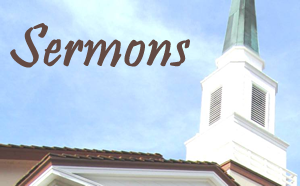 A Sermon preached by Randle R. (Rick) Mixon
A Sermon preached by Randle R. (Rick) Mixon
First Baptist Church, Palo Alto, CA
Sunday, July 26, 2015
Text: Ephesians 5:15-6:9; Philemon 1:3-21; Hebrews 13:1-8; James 5:1-6
As we have worked to make our road by walking it with Brian McLaren this past year, we have been given a set of three or four scripture passages to consider each week to direct us on our journey. This week we have four particularly challenging passages, especially for our contemporary context. I chose the one from Philemon for this morning’s ancient word but any of the four could have been used to explore what McLaren calls “the Spirit Conspiracy.”
The dictionary defines conspiracy as “an evil, unlawful, treacherous, or surreptitious plan formulated in secret by two or more persons; a plot.” It also indicates that it is a combination of persons for a secret, unlawful, or evil purpose.” This is hardly language we want to apply to the work of the Spirit or claim for our Christian enterprise. The last definition offered seems more in line with McLaren’s word play: a conspiracy is “any concurrence in action; combination in bringing about a given result.” So the Spirit Conspiracy is more a “concurrence in action,” a coming together in service of a common goal that will lead to a radical change in a situation. It’s plotting to upset of the status quo. It’s working in community toward a transformation of life.
In commenting on these passages, McLaren actually plays with the language of Mission Impossible – “Your mission, if you choose to accept it…” Conspiring with the Spirit in bringing about the Beloved Community of God is exhilarating but challenging work that we must choose and commit ourselves to. Sometimes it operates underground, works behind the scenes, is downright surreptitious in its progress toward bringing newness to life.
In each of the four passages from New Testament Epistles there is at least a hint of subversion to the status quo following the Jesus Way. The first passage is from Paul’s letter to the Ephesians (5:15-6:9). This is the passage in which Paul urges wives to “be subject” to their husbands,” husbands to “love” their wives, “children to obey” their parents. These are some of the words Southern Baptists and others use to “keep women in their place,” specifically, outside leadership in the church. But when Paul urges that the husbands love their wives and children and that familial relationships be characterized by honor and respect, he is subtly challenging patriarchy in which the male head of household had the right to treat wife and children as property with which he could do as he pleased. Is there conspiracy with the Spirit here to undermine the status quo in service of family life rooted and grounded in love? Love brings power to disrupt might, control, domination in establishing and sustaining human relationships.
Paul’s little letter to his friend, Philemon, is highly controversial. Paul has been faulted for not challenging the institution of slavery head on. That may be a fair critique. In this very personal communication, Paul sends the slave Onesimus back to serve his master. We know that this is one biblical passage that has been used to support institutional slavery. At the same time, apologists note that though Paul sends Onesimus home, he also urges Philemon to receive him as Paul’s adopted son and a brother in Christ. Instead of invoking legality, Paul appeals to Philemon on “the basis of love.” Again, we see the subversive power of love lifted up with Paul’s hope that it will transform the relationship of these two children of God and brothers in Christ.
In the passage from Hebrews (13:1-8), the writer addresses issues of undocumented aliens, prisoners, torture, marriage rights and the love of money. Here the writer more directly challenges the status quo. Fear of the foreigner, incarceration of poor debtors, torture of those arrested (as Jesus himself experienced,) marital infidelity and ruthless accumulation of wealth at the expense of the poor were social ills in the first century as much as they are today. Some things seem never to change.
Make room for strangers, care about and for those in prison, those who are victims of every kind of torture, learn to live in faithful relationship and honor all those who have committed themselves to one another, free yourselves from the love of money and be content with all with which you have been blessed. And, once more, it’s all undergirded by that transformative power of love. The writer begins his exhortation with these conspiratorial words, “Let mutual love continue.” Life in the Beloved Community depends on this mutual love.
Then James, perhaps the most outspoken of all, pulls no punches in his challenge to business practices that cheat the worker for the greed of the owner and to an economy in which the rich get richer and the poor get poorer. “Come now, you rich people, weep and wail for the miseries that are coming to you. Your riches have rotted, and your clothes are moth-eaten. Your gold and silver have rusted, and their rust will be evidence against you, and it will eat your flesh like fire. You have laid up treasure for the last days. Listen! The wages of the laborers who mowed your fields, which you kept back by fraud, cry out, and the cries of the harvesters have reached the ears of the Lord of hosts. You have lived on the earth in luxury and in pleasure; you have fattened your hearts in a day of slaughter. You have condemned and murdered the righteous one, who does not resist you” (James 5:1-6). Not a text many preachers would choose to preach on most Sundays, and yet here again we hear the word that undermines the status quo in the service of justice and equity, in service of building up the Beloved Community of God.
When it comes to the Spirit conspiracy, to plotting the Jesus Way, there are three key elements to consider. I am indebted to our friend and webmaster, Andy Kille, for sharing these in our ministers’ support group last week. He says there are three concerns that the world’s great religions hold in common – compassion, hospitality and service. My response was to say that most surely these are foundational to Christianity, necessary to plotting the Jesus Way – compassion, hospitality and service. In each of these difficult passages we see one or more of these elements at work, transforming the situation into something closer to Jesus’ vision of God’s beloved community.
Compassion, the capacity to feel with another, to walk in another’s shoes, to get inside another’s skin. If we take the time and make the space for compassion, it will be hard to hate, difficult to judge, challenging to mistreat. Compassion carries forward empathy, that capacity to care for another and to work for their well-being, to love our neighbors as we love ourselves. Compassion is crucial to Paul’s advice about how husbands and wives, parents and children, lovers and partners, ought to treat one another – with love and respect, tenderness and care for the well-being of all.
Hospitality is essential to the Jesus Way. All are welcome in this place. “Do not neglect to show hospitality to strangers,” the author of Hebrews says, “for by doing that some have entertained angels without knowing it.” Make room at the table, open your door, cheer the weary traveler, who knows what wonders God has in store for the hospitable. Ask Mary Granholm and others in our congregation how their lives have been blessed by the practice of hospitality. As the old spirituals sing “There’s plenty good room in my Father’s kingdom, just choose your seat and sit down” and “We’re gonna eat the welcome table one of these days.” Hospitality asks, why not now? And it’s not just the strangers. It’s prisoners, those who have been beaten down and tortured, those who have been left out and left behind, those who have been lied to and cheated, terrorized and abused, poor and struggling, the least and the last and the lost.
Service is the Jesus Way. It’s not enough to feel compassionate and hospitable. Something has to be done, making room, making a way, making life better for all creation. This is crucial work in the Jesus Way. To love God with your whole being, to love your neighbor as yourself, to let mutual love continue means there is work to be done. Earlier in his letter, James writes “What good is it, my brothers and sisters, if you say you have faith but do not have works? Can faith save you? If a brother or sister is naked and lacks daily food, and one of you says to them, “Go in peace; keep warm and eat your fill,” and yet you do not supply their bodily needs, what is the good of that? So faith by itself, if it has no works, is dead” (James 2:14-17).
Husbands and wives, partners and lovers, children and parents, families of every size and shape, friends and neighbors, co-workers and acquaintances, strangers and enemies, rich and poor the Jesus Way insists that we all come together in one big tent, that we learn to live together and share with one another and care for one another wherever we find ourselves in whatever circumstances on this small, fragile planet. Indeed we need to extend compassion, hospitality and service to the whole of creation.
“The Spirit that moves among us,” writes Brian McLaren, “is the same Spirit that moves in and through all creation. If we are attuned to the Spirit, we will see all creatures as our companions…even as our relatives in the family of God, for in the Spirit we are all related” (Brian D. McLaren, We Make the Road by Walking, p. 238). This is the wisdom of the Spirit Conspiracy. This is how we come to walk the Jesus Way – “to see all creatures as companions…as…relatives in the family of God.” So the plot thickens as we conspire with Spirit, as we make the dangerous, thrilling decision to walk the Jesus Way, as we devote ourselves to working for the Beloved Community. In today’s Word of Preparation, McLaren offers the challenge, “There are circles of people that the Spirit of God wants to touch and bless, and you are the person through whom the Spirit wants to work. Your mission, should you choose to accept it, is to conspire with the Spirit to bring blessing to others” (McLaren, op. cit., p. 235).
 We had an excellent Rally Day last Sunday. Thanks to everyone who pitched in to help with the last cook-out of the summer, especially when Eleanor Satterlee became ill. We are grateful for all the good work she does organizing our hospitality. We don’t always see what a task it is until we have to step up. Hugh reports that she is “on the mend.”
We had an excellent Rally Day last Sunday. Thanks to everyone who pitched in to help with the last cook-out of the summer, especially when Eleanor Satterlee became ill. We are grateful for all the good work she does organizing our hospitality. We don’t always see what a task it is until we have to step up. Hugh reports that she is “on the mend.”













